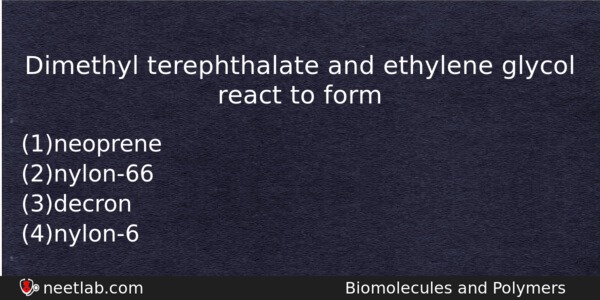| ⇦ | 
| ⇨ |
Dimethyl terephthalate and ethylene glycol react to form
Options
(a) neoprene
(b) nylon-66
(c) decron
(d) nylon-6
Correct Answer:
decron
Explanation:
Dacron (terylene) is obtained by the reaction of dimethyl terephthalate with ethylene glycol. Dacron is slightly hygroscopic and has high elastic recovery. It is non-inflammable and melts at 260°C.
Related Questions: - K₂Cr₂O₇ on heating with aqueous NaOH gives
- Which of the following is currently used as a tyre cord
- The equivalent mass of Fe in FeO is
- C₃H₉N cannot represent
- Reaction of diborane with ammonia gives initially
Topics: Biomolecules and Polymers
(88)
Subject: Chemistry
(2512)
Important MCQs Based on Medical Entrance Examinations To Improve Your NEET Score
- K₂Cr₂O₇ on heating with aqueous NaOH gives
- Which of the following is currently used as a tyre cord
- The equivalent mass of Fe in FeO is
- C₃H₉N cannot represent
- Reaction of diborane with ammonia gives initially
Topics: Biomolecules and Polymers (88)
Subject: Chemistry (2512)
Important MCQs Based on Medical Entrance Examinations To Improve Your NEET Score
18000+ students are using NEETLab to improve their score. What about you?
Solve Previous Year MCQs, Mock Tests, Topicwise Practice Tests, Identify Weak Topics, Formula Flash cards and much more is available in NEETLab Android App to improve your NEET score.
Share this page with your friends

Leave a Reply